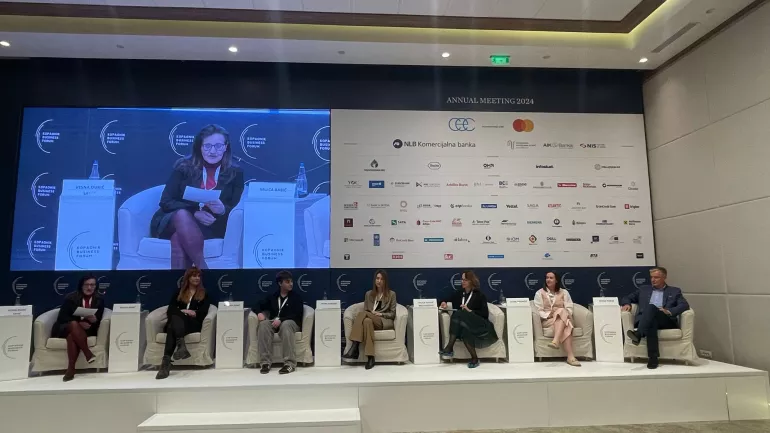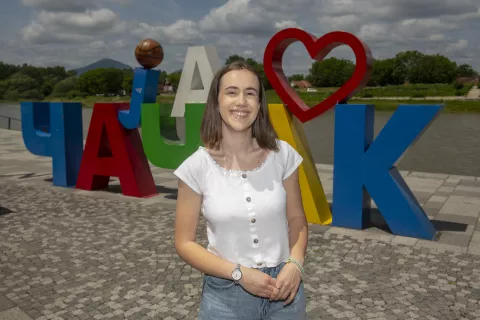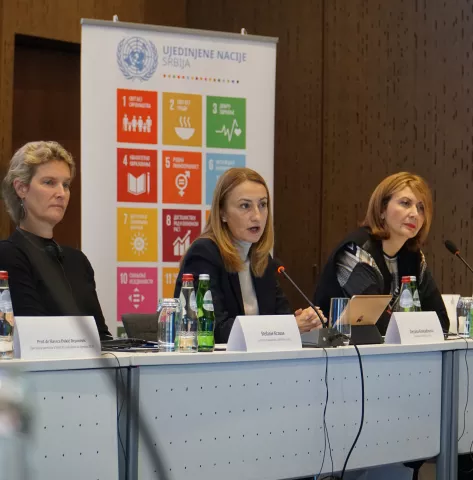Young people are calling on decision-makers and the business community to listen to them and involve them in the decision-making processes that concern them

- Available in:
- Srpski
- English
Kopaonik, 6 March 2024 – At the UNICEF panel “Youth Call for Action” held at the Kopaonik Business Forum, young people called on decision-makers – representatives of the business community and state institutions – to include them in matters concerning their well-being.
Members of UNICEF's Youth Board Milica Babic, Jelena Perunicic, and Bogdan Dimic talked with Prof. Milica Pejovic Milovncevic, Director of the Institute for Mental Health, Petra Kanuric, representative of the Startuj Infostud group, and Jovan Purar, representative of the MK Group, during a panel moderated by Vesna Savic Djukic from UNICEF.
The perspectives for young people depend on the environment in which they live, the relationships they form, the experiences and support they receive, the services available to them, social norms in their communities, and the extent to which they can influence decisions that concern them.
In the research on youth participation through UNICEF's U-Report platform, 75% of respondents said they believe that participation is not equally accessible to all young people. Respondents (almost 80% of them) also indicate a widespread belief that individuals with greater power and authority, such as government officials, parents, social workers, doctors, and others, inadequately respect and consider the views of young people.
Medical student Milica Babic highlighted during the panel that significant steps have been taken to provide support for the early childhood development to ensure the best start in life and ease the burden on their parents. She also conveyed a strong message about the need to provide such support services in smaller places and for the most vulnerable families.
Bogdan Dimic, a high school student from Vranje, spoke about the necessity of better connecting the business sector with the education system so that young people can acquire entrepreneurial skills and be better prepared for the needs of the labour market. Bogdan particularly emphasized the need for the business sector to be involved in the education process and economic inclusion of young people. “We need to collectively change traditional beliefs about entrepreneurship as a risky profession. We should work on empowering young people to realize their entrepreneurial ventures more easily,” said Bogdan Dimic.
Psychology student Elena Perunicic from Cacak discussed the challenges related to improving the mental health of young people. She emphasized that the innovative service available through the “Everything is OK” platform had a significant impact on reducing stigma among young people about talking about their problems. However, she drew attention to the need to provide mental health services through peer support and the education system.
Jovan Purar from MK Group, which, as part of its business strategy, dedicates significant attention to community investment, presented an example of supporting children and youth in Serbia and the region where they operate. He emphasized that MK Group also pays special attention to business practices related to employees, thereby supporting working parents.
“MK Group traditionally conducts socially responsible activities aimed at providing support to children and youth in various segments – from education, through healthcare, to assistance for socially vulnerable groups. However, of national significance is the Miodrag Kostić Foundation, which will gift our society the Palace of Science, the first centre for research and popularization of science in Serbia. With a generous donation exceeding 25 million euros, Miodrag Kostić aims to position knowledge as a universal value, especially among the younger generation. This space will open horizons for new generations, children, and students, providing young scientists with the opportunity to engage in research under conditions similar to the best world science centres,” said Jovan Purar, Director of Legal and General Affairs at MK Group.
Petra Kanuri from Startuj Infostud group spoke about what young people expect from employers and how to attract young people.
The largest global survey “The Future of Recruitment”, in which respondents from Serbia participated, shows that when it comes to work, young people consider having a healthy balance between private and professional life most important. This research is conducted by “The Network”, a global network of the most visited job sites, of which Infostud is a member, along with its platform for young people, Startuj Infostud, in collaboration with the Boston Consulting Group.
“Young people want to improve both professionally and personally, as well as nurture aspects of life other than work, and they expect companies to respond to these demands. This active and technologically advanced generation is becoming a key driver of change in the labour market and is encouraging companies to adapt appropriately to be effective in approaching young people and ensuring long-term connection with them,” emphasized Petra Kanuri from the Startuj Infostud group.
Prof. Dr. Milica Pejovic Milovancevic thanked the business sector for the support it provides to early childhood development programmes and the improvement of the mental health of children and young people, which take place with the support of UNICEF in Serbia.
“The challenges of modern life and the risks associated with growing up can sometimes outweigh the protective factors that a child or young person has within their family or group of friends. Therefore, the Institute for Mental Health and UNICEF have developed innovative telecounseling and psychological support services in schools, health centres, and institutions within the social welfare system, in collaboration with non-governmental organizations, for thousands of young people in Serbia. The recent signing of the Memorandum of Understanding by 6 ministers demonstrates the readiness for support to be available to every young person in Serbia,” emphasized Prof. Dr. Milica Pejovic Milovancevic.
Young people concluded that it is important to have the opportunity for their voices to be heard – to express their opinions, needs, and fears. They are particularly encouraged by the willingness and determination of young people to engage with their peers, decision-makers, and the business community to jointly achieve positive changes for children and young people in Serbia.
Media contacts
O UNICEF-u
Prisutni smo u više od 190 zemalja i teritorija, a kroz sve što radimo promovišemo prava i dobrobit dece, posebno one koja su najugroženija i isključena. U potpunosti se finansiramo od dobrovoljnih priloga pojedinaca, država i vlada, fondacija i kompanija.
Pratite UNICEF Srbija na: Facebook-u, Twitter-u, YouTube-u, Instagram-u i LinkedIn-u.




